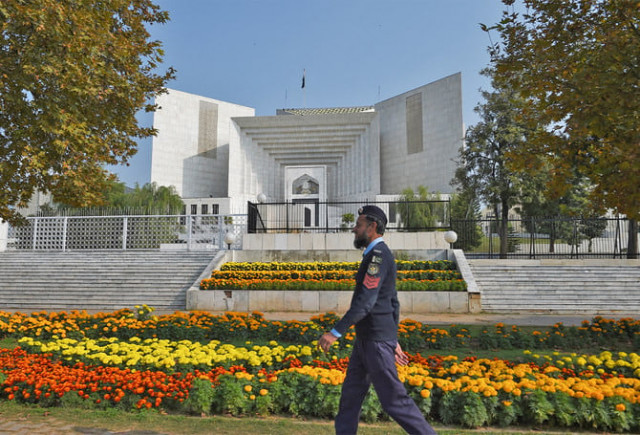AGP seeks structuring of SC elevation criteria
Throws weight behind Justice Masood’s rationale for snubbing CJP's nominees

Throwing weight behind Justice Sardar Tariq Masood’s rationale for snubbing CJP Umar Ata Bandial’s five nominees for the Supreme Court, AGP Ashtar Ausaf Ali has emphasised that the requisite criteria must be structured for the elevation of high court judges to the top court.
In a statement issued on Saturday night, the AGP noted that the elevation of “most outstanding” jurists in a manner that is rooted in merit and process was vital for the dispensation of justice.
The statement said that the AGP was dismayed by the controversy arising from the recent proceedings of the Judicial Commission of Pakistan.
He stressed that he had consistently taken the position that appointments to high judicial office must be premised on merit, and in light of Articles 175 and 177 of the Constitution of Pakistan, adding that it was imperative to structure the criteria.
“This will ensure not only that elevations are made in the public interest, but also that the Members of the Judicial Commission may confirm appointments in an atmosphere of collaboration and mutual goodwill.”
The AGP said he had put the same recommendation during the JCP’s proceedings on July 28, adding that he appreciated the hard work put in by Justice Sardar Tariq Masood and endorsed his stance. “I categorically stated that I agree with him.”
He pointed out that in the interest of propriety, he refrained from commenting on the merits of each nominee.
"I, however, observed, and continue to maintain, that the honourable Chief Justice of the Islamabad High Court is eminently qualified to be considered for elevation to the apex court, and that such elevations, in any event, must be made against existing vacancies, no more and no less.”
He further underlined that the rejection or confirmation of candidates must be regulated by guiding rules, adding that these rules must be settled beforehand, and the data of any new candidates must be thoroughly assessed accordingly.
“It was for this particular reason that I suggested that the meeting be deferred until the approval of such criteria. It is hoped that those same self-evident reasons will no longer be misconstrued," the statement read.
Ashtar Ausaf noted that to fulfil the sacred trust of appointments, members must afford one another a full and unimpeded airing of their views and regretted that the conclusion of the meeting precluded Justice Qazi Faez Isa from completing his remarks, “which we were all continuing to benefit from”.
“By way of conclusion, I am constrained to observe that the proceedings of the Judicial Commission can no longer be marked by such acrimony. We find ourselves in these rather transient offices as fiduciaries: our duty is to the republic we serve, not the travails of our personal experience,” the statement issued by the AGP office concluded.
Non-inclusion of IHC CJ in the list
Meanwhile, several JCP members have expressed their concerns over the non-inclusion of Islamabad High Court (IHC) Chief Justice Athar Minallah’s name in the recommendation for elevation to the apex court.
According to JCP member Justice Sardar Tariq Masood, CJP Umar Ata Bandial, in an informal meeting, had said that there was no “concept” to elevate the IHC judge to the apex court.
He, however, said that under Article 175 of the Constitution, a judge should be elevated from high courts. "We have the example of ex-IHC chief justice Iqbal Hameedur Rehman who was elevated from the Supreme Court.”
Justice Masood wondered why the name of IHC CJ had been ignored for the purpose and termed the recommendations as “contradictory”. He noted that new JCP member Justice Sajjad Ali Shah, who is retiring next month, was fortunate enough to appoint his own successor.
However, the SC judge said that the Constitution did not allow anticipating a vacancy, adding that rules cannot override the Constitution.
Justice Masood pointed out that in the case of the appointment of a junior judge there should be a valid reason to bypass the senior judges. He also referred to the previous meeting of the JCP wherein it was emphasised that there should be a criterion for the appointment of judges.
He said a committee was constituted for the purpose but neither rules nor a criterion has been framed by it.
While questioning the Sindh High Court (SHC) chief justice’s refusal to be elevated to the apex court, Justice Masood said that a letter submitted by him in this regard was not enough.
If he refused then Article 206 (2) of the Constitution should be enforced as he would be deemed to retire as no judge can refuse, he said, wondering how the high court judges, who are ignored, could be appointed in future.
He asked why the senior judges were not being considered now if they could be appointed to the top court in future. "We should not manipulate the system. Why discrimination is being done in our own institution," he added.
The apex court judge also referred to the superior bars’ reservations for not adhering to the seniority principle in the appointment of apex court judges. He asked why data regarding the SHC CJ’s decision was not being provided.
Justice Masood through comparative data established that senior judges of the SHC, as well as of the LHC, were more competent and efficient as compared to those who were recommended by the CJP.
Another JCP member Justice (retd) Sarmad Jalal Osmani said that SHC judge Justice Aqeel Abbasi, who is ranked at number three on the SHC seniority list, should be considered for elevation to the SC.
He hailed Justice Abbasi saying most of the cases disposed of by the SHC judge were related to tax as he had been a tax lawyer previously.
"I believe he (Justice Abbasi) was bypassed twice. That is why he is slightly bitter,” he added.
Pakistan Bar Council (PBC) representative in JCP Akhtar Hussain also advocated the elevation of IHC CJ as well as Justice Abbasi.
Law Minister Azam Nazeer Tarar conveyed to the Parliamentary Committee on Judges Appointment members, saying their decisions for not approving JCP proposals were not being honoured as 95 per cent of them were overturned by the superior courts.
Tarar said the committee was a constitutional body, comprising members from the treasury as well as opposition benches. He stressed the name of IHC CJ should be considered for elevation to the top court.
He said the top court’s judgement in the Munir Bhatti case should be revisited as it made the committee ineffective.
Meanwhile, Justice Ijazul Ahsan, another JCP member, strongly supported all CJP's nominees.



















COMMENTS
Comments are moderated and generally will be posted if they are on-topic and not abusive.
For more information, please see our Comments FAQ